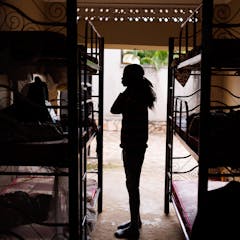
Articles on HIV
Displaying 1 - 20 of 375 articles

When appropriate care is available, several studies have shown, gay Black men are more likely to test themselves for HIV and engage in less risky sexual behaviors than gay men of other races.

People who take antiretroviral drugs have a much lower risk of getting multiple sclerosis – especially women.

Two-thirds of new HIV infections are among gay and bisexual men. Although cases have decreased among white men, they have stagnated among communities of color.

Climate change, inequality, the evolution of knowledge… Experts have been surveyed, and a consensus is emerging on what to expect from the effects of these factors in the medical field.

His teaching spoke practically but compassionately to the needs of the African child.

A Lancet profile of Jerry Coovadia described him as the ‘Nelson Mandela’ of healthcare. Glenda Gray pays tribute to a legend

Many people at heightened risk for HIV have never been tested. Those who have self-tested for HIV often don’t go on to receive care or change their sexual behavior.

In South Africa men are 70% more likely to die from TB than women. Tackling social factors such as smoking and high alcohol consumption could save more lives.

Stigmatised people living with HIV often suffer from fear, depression and abuse. It’s sometimes easier to stop a treatment regime than risk being ostracised or assaulted by the community.

Among young children, adolescents and adult women, anemia strikes 1 in 3 globally. Most cases are driven by dietary iron deficiency, red blood cell disorders and untreated tropical diseases.

Negative emotions, especially regret, are seldom expressed when talking about motherhood.

When people living with HIV in Nigeria receive support from close friends, they are less likely to experience stigma and associated poor health outcomes.

Twelve states do not require sex education of any kind.

Africa is suffering from a silent, but costly, epidemic of fungal infections.

The vulnerability of migrants was highlighted during the COVID-19 pandemic when restrictions affected people’s ability to travel to access treatment.

We know from other viruses that viral fragments can remain in different tissues for months or even years. This could be the case for long COVID.

Alcohol use contributes to over 200 different diseases, injuries, and conditions. It is also a risk factor for gender-based violence and violent crime.

A backlash against progress in gender and sexual rights is common.

The criminalisation of same-sex sexual relations among consenting adults in Kenya worsens social disparities and inequalities.

Cervical cancer is one of the most common cancers in women. Mortality rates in sub-Saharan Africa are three times higher than the global average.
